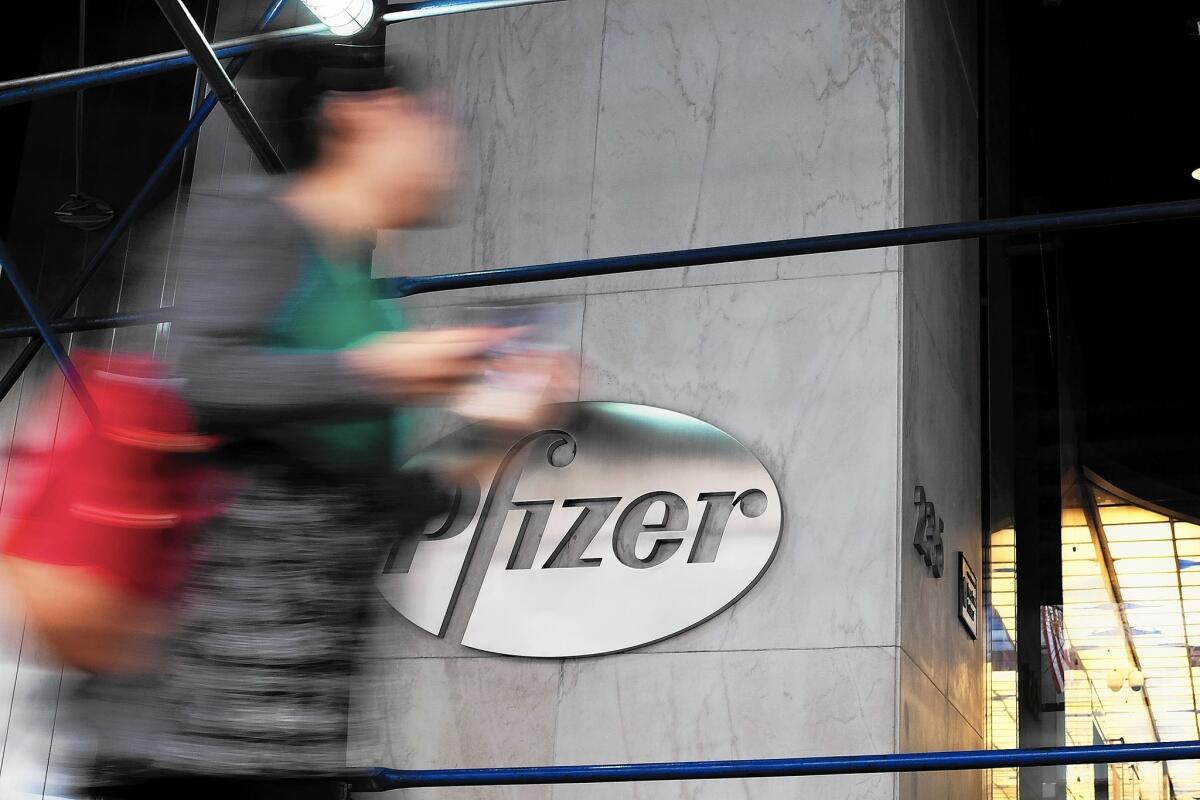By buying Ireland-based Allergan, Pfizer could avoid higher U.S. rates

- Share via
News of preliminary merger talks between drugmakers Allergan and Pfizer Inc. has reignited concerns about U.S. companies moving headquarters overseas to avoid higher corporate tax rates.
Allergan cautioned Thursday that there was “no certainty” that the “friendly” discussions would lead to a transaction. But many analysts believe that the deal could be the largest so-called tax inversion ever, which would enable New York City-based Pfizer to escape higher rates in the U.S. by buying a foreign company and reincorporating abroad.
There’s precedent for Pfizer’s potential motivations. Last year, the company made an unsuccessful bid for British drugmaker AstraZeneca in hopes of achieving a lower corporate tax rate overseas, said Jonathan Morgan, head of research at the Edge Consulting Group, an equities research firm specializing in mergers and acquisitions.
See the most-read stories this hour >>
Allergan is based in Dublin, Ireland, which has a corporate tax rate of 12.5%. The federal corporate tax rate in the U.S. is 35%, the highest among developed nations.
To avoid being classified as an inversion, the target company’s shareholders must own less than 60% of the combined company.
Over the years, the U.S. government has taken a number of steps to limit inversions. Most recently, the Treasury enacted tax code revisions last September that limited companies’ ability to shield overseas earnings from high U.S. taxes, said Adam Rosenzweig, a law professor at Washington University in St. Louis.
Inversions can be especially attractive to drug companies because they can transfer their valuable intellectual properties, such as patents, overseas.
But there are still a number of loopholes. The inversion rules don’t apply to foreign acquisitions of U.S. firms and mergers of companies with equal value. The rules also don’t address earnings stripping, in which an overseas company reduces its taxes through loans to its U.S. subsidiary.
Further legislation on inversions has been stalled in Congress, and the deals have continued to form.
Last year, Miami-based Burger King Worldwide Inc. bought Canadian coffee and doughnut chain Tim Hortons Inc. and moved its tax base north. That same year, Minneapolis-based medical device maker Medtronic Inc. acquired European rival Covidien and moved to Ireland.
“The incentive to combine across borders and shift U.S. income to lower tax foreign jurisdictions is still there,” said Steven Rosenthal, senior fellow at the Urban-Brookings Tax Policy Center. “Until Treasury goes further in its regulatory approach or until Congress tries to deal with some of the loopholes that exist ... we’re going to see those combinations.”
Inversions have even become a political hot topic among presidential candidates. Hillary Rodham Clinton has said she will end tax inversions, while Donald Trump has called for lowering corporate taxes.
But there’s a chance that a potential merger between Allergan and Pfizer would not even qualify to be considered an inversion.
Both companies said in separate statements that they would not comment on “speculation regarding the terms of a potential transaction,” and there are few details of the deal.
“Lots of people have assumed this will be an inversion transaction, but neither party has confirmed,” said Edward Kleinbard, professor of law and business at USC.
Allergan’s market capitalization is about $120 billion, compared with Pfizer’s $214 billion. Rosenthal said the two companies’ lawyers will probably try to arrange the combination to stay below the inversion threshold in which the foreign company’s shareholders own 40% of the combined operation.
The deal could be so high profile that it could lead to new regulations.
“I think a combination like this could force Treasury’s hand,” Rosenthal said.
Twitter: @smasunaga
MORE FROM BUSINESS:
Review: Apple TV brings iPhone-like apps to the big screen
Nintendo unveils its first game for smartphones in long overdue move
Amazon cuts back on price, delivery times by cheating workers, lawsuit says
More to Read
Inside the business of entertainment
The Wide Shot brings you news, analysis and insights on everything from streaming wars to production — and what it all means for the future.
You may occasionally receive promotional content from the Los Angeles Times.










